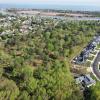I sent the Lewes Mayor and City Council a letter this morning, urging them to change the annexation zone ordinance to match that of Sussex County with regard to excluding wetlands from any density calculations and to make it applicable to the recently annexed Brittingham property.
I just learned 20 minutes later that mayor and council held a private executive session Monday and voted to exempt the Brittingham developer from any changes to the annexation zone. And then I received the Breaking News alert from your paper and read the details in Nick Roth’s article “Brittingham property not subject to code changes.”
The rationale for this decision seems to be the mayor and council’s fear of being sued. It is extremely disappointing to hear that any new annexation zone ordinance will not apply to the Brittingham parcel. This was our chance to protect the wetlands adjacent to the Brittingham property, and surrounding wetlands.
The higher the density of a development, the more impervious surface. Imperviousness is the most critical indicator for analyzing impacts of urbanization on the water environment. The more impervious surface, the less forested lands, wetlands, and other forms of open space that absorb and clean stormwater in the natural system. Impervious surfaces lead to reduced infiltration, higher runoff, more flooding, higher peak streamflows, and increased streambank and bed erosion.
Impervious surfaces also cause more rapid delivery of nutrients, sediment, and contaminants from the land to streams by routing runoff directly into streams and bypassing the filtration and retention services provided by wetlands and riparian forest buffers. Biological and chemical impairment of streams can occur when the proportion of impervious surfaces in a watershed exceeds 5 to 6 percent.
The north side of town has a high water table and low infiltration rates, which result in frequent flooding on our properties. We need to minimize the amount of impervious surfaces to provide ourselves with enough time to figure out how to mitigate the damage from rising sea levels.
While I believe the carrying capacity for dwellings and population in the City of Lewes has already been reached and likely exceeded, I understand that people have a right to sell their property. But, I do not believe developers have an inherent right to build dwellings at densities that will exacerbate the flooding and drainage problems we already have.
By excluding all wetlands from density calculations and increasing buffers, we can reduce the amount of impervious surface, thereby reducing the negative impacts of new developments on our safety, the environment, and our property values. Residents and vacationers already suffer through traffic jams trying to navigate through town and waste valuable time trying to find parking spaces at Cape Henlopen State Park and Lewes Beach.
Why encourage more of this by allowing higher densities in our new developments?
At the Oct. 30, 2018 public hearing on the Brittingham annexation, I noted that Sussex County had proposed to exclude wetlands from density calculations and I wondered whether we would do the same if the county approved the proposal. City Planner Tom West noted that one of the criteria for developing the annexation district was compatibility with Sussex County. The record shows that the developer was put on notice; he should not be surprised if the mayor and council revises the ordinance to be at least as restrictive as the county. The county has done the right thing. We should do even better.
The Brittingham property would stick out like a sore thumb on New Road if developed as proposed. I sincerely hope the mayor and council replaces the annexation ordinance with a more carefully crafted ordinance that results in lower building densities and reverses its decision to exclude the Brittingham property from the new ordinance. If Lewes residents hire an attorney to challenge this decision, I believe we would have a good chance of prevailing. The question is, will we be able to raise the funds?
Marta Nammack
Lewes





















































